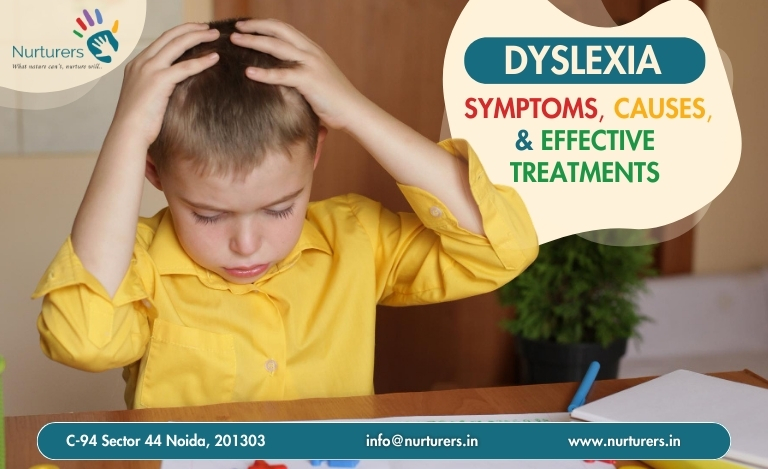What Is Dyslexia? Symptoms, Causes and Treatments
Dyslexia is a learning disorder that affects how the brain processes language. This blog explores the symptoms, causes, and treatment options for dyslexia, providing valuable insights for parents, educators, and individuals with dyslexia.
What Is Dyslexia?
Dyslexia is a neurological condition that impairs a person’s reading, writing, and spelling abilities, affecting how the brain processes language. Despite common misconceptions, dyslexia is not related to intelligence or laziness. Individuals with dyslexia often possess strong verbal and problem-solving skills.
Causes of Dyslexia
The exact cause of dyslexia is not fully understood, but research suggests it has a genetic component. Differences in brain structure and function related to language processing are believed to contribute to dyslexia. It’s important to note that dyslexia is not caused by poor teaching or lack of effort.

Symptoms of Dyslexia
Dyslexia manifests in various ways, and symptoms can vary in severity. Common symptoms include:
- Difficulty with reading fluency and accuracy
- Challenges with spelling and writing
- Trouble with phonics and phonemic awareness
- Difficulty with word recognition and decoding
- Problems with understanding what is read
- Avoiding reading and writing tasks
It’s essential to remember that dyslexia is a spectrum disorder, and individuals with dyslexia exhibit varying degrees of difficulty.

Treatment and Support for Dyslexia
With early identification and appropriate support, individuals with dyslexia can overcome challenges and achieve success. Treatment typically involves a multidisciplinary approach:
- Specialized instruction: Tailored teaching methods to address specific reading difficulties.
- Phonics-based instruction: Building a strong foundation in phonics to improve decoding skills.
- Reading fluency practice: Developing automaticity in reading to improve comprehension.
- Writing support: Strategies for improving spelling, grammar, and writing organization.
- Technology: Utilizing assistive technology tools to support reading and writing.
- Accommodations: Providing modifications in the classroom or workplace to reduce challenges.

Special Education for Dyslexia
For children with dyslexia who require additional support, special education services can be beneficial. It’s important to work closely with educators to develop an Individualized Education Plan (IEP) that addresses the child’s specific needs.
Can Dyslexia Be Cured?
Dyslexia is a lifelong condition, and there is currently no cure. However, with appropriate support and strategies, individuals with dyslexia can overcome challenges and achieve success.
Overcoming Dyslexia
While dyslexia cannot be cured, it can be managed effectively. Early identification and intervention are crucial for developing coping strategies and building confidence.
- Focus on strengths: Individuals with dyslexia often possess strong visual, spatial, and creative skills. Enhancing these strengths can elevate self-confidence.
- Develop compensatory strategies: Learning techniques to overcome reading and writing difficulties can improve academic and professional performance.
- Utilize assistive technology: Tools like text-to-speech software and speech-to-text can significantly enhance communication and productivity.
- Seek support: Connect with other individuals with dyslexia, join support groups, and advocate for appropriate accommodations.
Borderline Dyslexia
Borderline dyslexia is a term sometimes used to describe individuals who exhibit some characteristics of dyslexia but do not meet the full criteria for a diagnosis. These individuals may experience mild difficulties with reading, writing, or spelling.
While borderline dyslexia doesn’t typically require intensive intervention, providing support and accommodations can help individuals reach their full potential. Early identification and appropriate strategies can prevent frustration and academic difficulties.
Conclusion
Dyslexia is a learning disorder that affects individuals differently. With early identification, proper support, and effective strategies, individuals with dyslexia can overcome challenges and lead successful lives. It’s essential to dispel myths and promote understanding to create a supportive environment for individuals with dyslexia.
If you are looking for special education or individualized education plans for your child, Nurturers can be your partner in this journey. We offer comprehensive support and guidance to help children with dyslexia reach their full potential. Our team of experts provides tailored therapies and educational programs to address specific needs.
Call Us: 8920810636

Hi! I am Swati Suri, a Special Educator with 9+ years of experience and the founder of Nurturers. I am passionate about helping children with special needs and supporting their families every step of the way.

